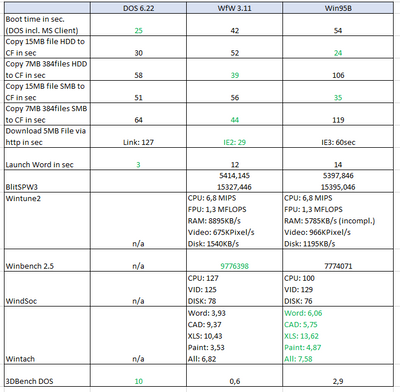First post, by Marco
Hi all,
I just let some benchmarks ran on my retroPC. Some interesting numbers as I think although I have the feeling that the results do sometimes differ based on the n° of benchmark-passes.
Base system:
- 386SX/27,5
- 13,75MHz ISA
- GD5428 Video
- 8MB RAM
- CF and 7200/16MB HDD
Have fun
1) VLSI SCAMP 311 | 386SX25@30 | 16MB | CL-GD5434 | CT2830| SCC-1 | MT32 | Fast-SCSI AHA 1542CF + BlueSCSI v2/15k U320
2) SIS486 | 486DX/2 66(@80) | 32MB | TGUI9440 | SG NX Pro 16 | LAPC-I
